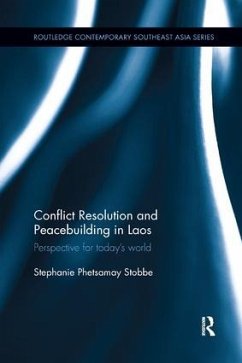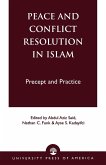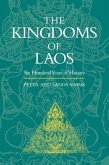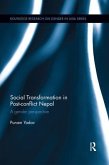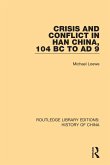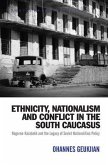Using the case study of Laos, a small landlocked country in Southeast Asia that has seen some of the world's most brutal forms of poverty and violence, this book examines the power of traditional and indigenous conflict resolution systems as a tool for social justice. It explores how the conflict resolution mechanisms build infrastructures that support social harmony, and address larger scale conflicts within communities, nations and international arenas.
The book discusses how over centuries, foreign powers have polarised and used the ethnic groups of Laos to support their own agendas, and how in spite of this, the Lao people have consistently managed to recreate the peace and harmony that support their social relationships, whether that is within groups or between many distinct groups. Through the development and use of appropriate grassroots conflict resolution structures that do not require a formal court system and exists outside the political arena, they have been successful in resolving conflicts within and across cultural groups. The book shows that the conflict resolution systems of Laos are embedded in the fabric of ordinary, everyday life, and operate independently of the hierarchical structures that dominate governing institutions.
Highlighting how peace continues to work its way into existence, through elaborate mediation systems and rituals that bring people together, this book will be of use to students and scholars of Southeast Asian Politics, Peace Studies and War and Conflict Studies.
Hinweis: Dieser Artikel kann nur an eine deutsche Lieferadresse ausgeliefert werden.
The book discusses how over centuries, foreign powers have polarised and used the ethnic groups of Laos to support their own agendas, and how in spite of this, the Lao people have consistently managed to recreate the peace and harmony that support their social relationships, whether that is within groups or between many distinct groups. Through the development and use of appropriate grassroots conflict resolution structures that do not require a formal court system and exists outside the political arena, they have been successful in resolving conflicts within and across cultural groups. The book shows that the conflict resolution systems of Laos are embedded in the fabric of ordinary, everyday life, and operate independently of the hierarchical structures that dominate governing institutions.
Highlighting how peace continues to work its way into existence, through elaborate mediation systems and rituals that bring people together, this book will be of use to students and scholars of Southeast Asian Politics, Peace Studies and War and Conflict Studies.
Hinweis: Dieser Artikel kann nur an eine deutsche Lieferadresse ausgeliefert werden.
"Conflict Resolution and Peacebuilding in Laos offers an ethnographically rich portrayal of Lao cultural ceremonies and rituals that stresses the importance of grassroots practices to conflict resolution... this short, accessible, book does bring new themes of analysis to the study of Laos. It also provides rich ethnographic descriptions of Lao conflict resolution practises that are likely to be of interest to both students and scholars of peace and conflict studies, particularly from an intellectual standpoint that seeks to contest Western conceptual frameworks."
Kearran Sims, Western Sydney University, Contemporary Southeast Asia
"It presents a collection of chapters about different topics relevant to multidisciplinary studies that will help to expand our understanding of conflict resolution in Lao's PDR and also apply this knowledge to understand conflict resolution in other places in the world... The audience of the book will be academics, students, lawyers, humanitarian workers, peacekeepers and nonprofit organizations with an interest in Southeast Asian Studies, War Studies and Conflict Studies."
Patricia Ordóñez de Pablos, The University of Oviedo, International Journal of Asian Business and Information Management
"This volume successfully overcomes many of the limitations of academic studies by drawing on real examples and folktales from local communities in Laos. The book is highly effective in the way it explores concepts by first presenting a story or real example of a dispute, then analysing relevant features of the Laotian conflict resolution process, and finally explaining how such features are reflected in the example. A highly valuable body of research is presented here in clear and insightful ways, and Phetsamay Stobbe's book is sure to be widely used as a significant resource for both academics and practitioners in the field of conflict resolution."
SungYong Lee, National Centre for Peace and Conflict Studies, University of Otago, New Zealand
Kearran Sims, Western Sydney University, Contemporary Southeast Asia
"It presents a collection of chapters about different topics relevant to multidisciplinary studies that will help to expand our understanding of conflict resolution in Lao's PDR and also apply this knowledge to understand conflict resolution in other places in the world... The audience of the book will be academics, students, lawyers, humanitarian workers, peacekeepers and nonprofit organizations with an interest in Southeast Asian Studies, War Studies and Conflict Studies."
Patricia Ordóñez de Pablos, The University of Oviedo, International Journal of Asian Business and Information Management
"This volume successfully overcomes many of the limitations of academic studies by drawing on real examples and folktales from local communities in Laos. The book is highly effective in the way it explores concepts by first presenting a story or real example of a dispute, then analysing relevant features of the Laotian conflict resolution process, and finally explaining how such features are reflected in the example. A highly valuable body of research is presented here in clear and insightful ways, and Phetsamay Stobbe's book is sure to be widely used as a significant resource for both academics and practitioners in the field of conflict resolution."
SungYong Lee, National Centre for Peace and Conflict Studies, University of Otago, New Zealand

